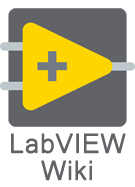GOOP - Graphical Object Oriented Programming: Difference between revisions
Appearance
m added a description of GOOP with respect to its features |
|||
| Line 1: | Line 1: | ||
== GOOP - Graphical Object Oriented Programming == | == GOOP - Graphical Object Oriented Programming == | ||
GOOP stands for Graphical Object Oriented Programming. It is a category of frameworks for non-native object-oriented programming in LabVIEW that support by reference objects with VI methods for operating on data. Some versions of GOOP support inheritance and dynamic dispatch. GOOP really hit mainstream with the release of the [http://zone.ni.com/devzone/cda/tut/p/id/3391#3 GOOP Toolkit] from [http://www.endevo.se/ Endevo] and [ | GOOP stands for Graphical Object Oriented Programming. It is a category of frameworks for non-native object-oriented programming in LabVIEW that support by reference objects with VI methods for operating on data. Some versions of GOOP support inheritance and dynamic dispatch. GOOP really hit mainstream with the release of the [http://zone.ni.com/devzone/cda/tut/p/id/3391#3 GOOP Toolkit] from [http://www.endevo.se/ Endevo] and [[National Instruments]]. OpenG even has its own version of GOOP, called [[OpenGOOP]]. | ||
GOOP is great because it allows you to build components that encapsulate their data, functionality, and behavior. Why ecapsulate?... | GOOP is great because it allows you to build components that encapsulate their data, functionality, and behavior. Why ecapsulate?... | ||
Revision as of 19:37, 13 April 2007
GOOP - Graphical Object Oriented Programming
GOOP stands for Graphical Object Oriented Programming. It is a category of frameworks for non-native object-oriented programming in LabVIEW that support by reference objects with VI methods for operating on data. Some versions of GOOP support inheritance and dynamic dispatch. GOOP really hit mainstream with the release of the GOOP Toolkit from Endevo and National Instruments. OpenG even has its own version of GOOP, called OpenGOOP.
GOOP is great because it allows you to build components that encapsulate their data, functionality, and behavior. Why ecapsulate?...
Benefits of Encapsulation
- Maintainable
- Scalable
- Useable (and therefore Reusable)
- Testable
- Enable Multiple Developer Collaboration
See Also
External Links
- App Note 143 – Graphical Object Oriented Programming (Jorgen Jehander)
- Graphical Object-Oriented Programming with LabVIEW – NI Week 1999 Presentation by Jörgen Jehander and Stepan Riha
- Download GOOP Toolkits from NI
- Object-Oriented Techniques in LabVIEW – Pure G examples from LV 4.1
- Endevo - the company that supports/develops the GOOP Toolkit
- GOOP/G++ - Robert Burke's Web Page
